The Plextor M3 (256GB) Review
by Kristian Vättö on April 5, 2012 3:05 AM ESTRandom and Sequential Read/Write Speed
The four corners of SSD performance are as follows: random read, random write, sequential read and sequential write speed. Random accesses are generally small in size, while sequential accesses tend to be larger and thus we have the four Iometer tests we use in all of our reviews. Our first test writes 4KB in a completely random pattern over an 8GB space of the drive to simulate the sort of random access that you'd see on an OS drive (even this is more stressful than a normal desktop user would see). We perform three concurrent IOs and run the test for 3 minutes. The results reported are in average MB/s over the entire time. We use both standard pseudo randomly generated data for each write as well as fully random data to show you both the maximum and minimum performance offered by SandForce based drives in these tests. The average performance of SF drives will likely be somewhere in between the two values for each drive you see in the graphs. For an understanding of why this matters, read our original SandForce article.
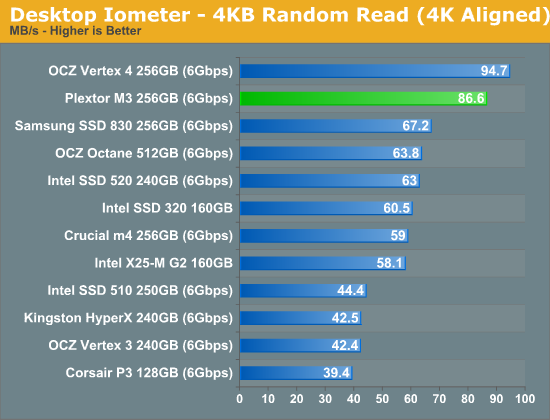
Plextor M3 provides very good 4KB random read performance. Looking at the Crucial m4 that uses the same Marvell controller, the Plextor M3 is 47% faster in random performance, so Plextor has clearly paid attention to their firmware.
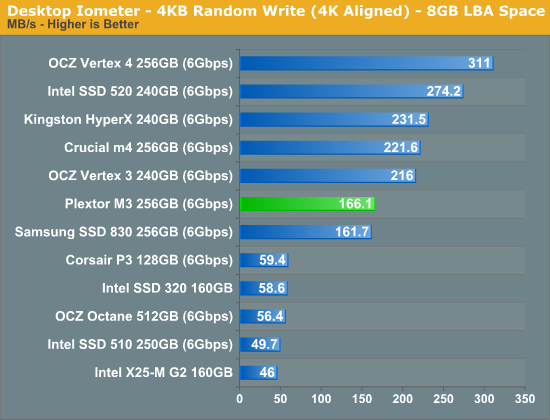
Random write performance is not as great as random read but still quite good enough for most workloads. This time Crucial's m4 comes out 33% faster than the M3, while the SF-2281 drives are all faster as well—write less data thanks to realtime compression and data deduplication techniques and your write speeds should generally be faster.
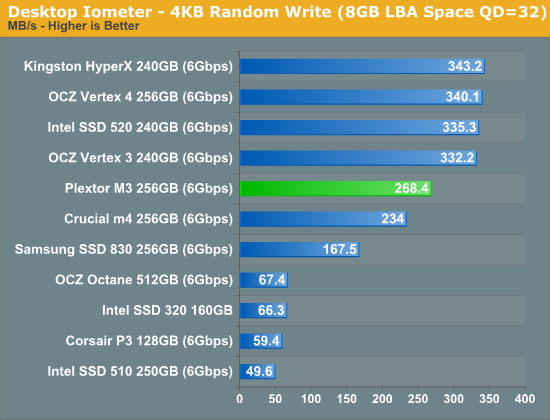
Switching the queue depth to 32 shows the difference between SandForce and non-SandForce quite well. SandForce is in its own class but among the Marvell SSDs, the Plextor M3 is the fastest. It's important to note that only heavy I/O workloads use queue depths that reach 32; most usage models don't go over 5.
Sequential Read/Write Speed
To measure sequential performance we ran a one minute long 128KB sequential test over the entire span of the drive at a queue depth of 1. The results reported are in average MB/s over the entire test length.
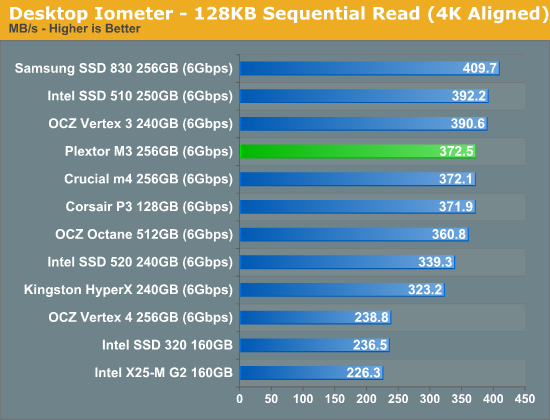
Sequential read speed is identical to Crucial m4 and Corsair P3, and good if not class leading for a SATA 6Gbps SSD.
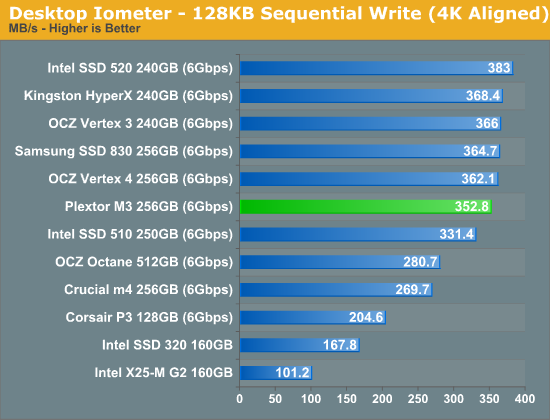
In sequential write speeds, the M3 is once again the fastest Marvell based SSD and is only a few percent behind SandForce based SSDs.










113 Comments
View All Comments
magnetar - Saturday, April 7, 2012 - link
... that the Intel 510 SSD also uses the Marvell 9174 controller. I'm pleased that the 510 is still included in many SSD reviews at AnandTech, although it is dismissed as old and slow by some enthusiasts.The Samsung SSD Magician is the "gold standard" of SSD support programs? Personally I prefer Intel's SSD Toobox, the 3.0 version of course. I use both, and they are excellent, I've never had a problem with either of them. I like Intel's Toolbox UI over Samsung's Magician, the latter running in the background when not in use for some reason. Magician has more functions than the Toolbox, so has it beat in that aspect. Both allow firmware updates in the Windows environment... priceless!
LokutusofBorg - Saturday, April 7, 2012 - link
Yeah, I noticed this too. That part of the article should be updated to say "Intel's 510 and 520 series..." or some such.sunsin - Saturday, April 7, 2012 - link
Kristian, I compared the result with Intel SSD 520Intel SSD 520 240GB Clean 284.5 MB/s After Torture 162.9 MB/s After TRIM 162.9 MB/s
Plextor M3 256GB Clearn 328 MB/s After Torture 302.1 MB/s After TRIM: 327.1 MB/s
The Plextor M3 has way better performance than Sandforce based SSD where the TRIM will never restore the clean performance. This does mean that Plextor will be better option for long term use.
In addition, you mentioned that Sandorce based SSD will be a better choice for OS without official TRIM support, please provide some comparative figure to support this. The After Torture performance for Plextor vs Sandforce can be 302.1 vs 162.9 MBs. The win by 80%. Please explain why you always suggest Sandforce based SSD For OS without TRIM?
Kristian Vättö - Saturday, April 7, 2012 - link
First off, we use different methods for TRIM testing on SF and non-SF drives. Non-SF drives are filled and tortured with compressible data as that is what HD Tach uses. SF drives, on the other hand, are filled and tortured with incompressible data and then benchmarked with AS-SSD which uses incompressible data as well. The length of the torture can vary as well. Hence you can't directly compare the results.In the case of Intel 520 and Plextor M3, Intel 520 was tortured for 60 minutes and it still managed a speed of 162.9MB/s. The numbers you have for Plextor are after 20 min torture. I also included a graph of 60min torture and the average write speed dropped to 54.9MB/s. Does this make sense to you now?
SandForce's advantage is extremely low write amplification: http://images.anandtech.com/graphs/graph5529/44082...
When you write less, there is also less garbage collection to do. Here is one graph that Anand linked earlier which compares TRIM/GC of drives: http://images.anandtech.com/graphs/graph5719/45462...
However, like I noted in the TRIM part, there should be absolutely no problem in running M3 in an OS without TRIM. IF you are an extreme user and you'll be constantly hammering the drive under OS with no official TRIM support, then a SandForce drive may be a better solution. Most people's workload isn't like that and any decent SSD should do the job.
I maintain a huge SSD sticky at MacRumors and I've only seen a few users complain about performance degradation, and nowadays we would consider those SSDs to be ancient anyway. Besides, if the performance degrades, you can always enable TRIM temporarily in OS X and TRIM the drive, then disable TRIM.
jwilliams4200 - Monday, April 9, 2012 - link
Note that the "Steady State 4KB Random Write Performance" graph has highly misleading results.The steady-state 4KB QD=32 random write performance of the Vertex 3 when tested with random data streams (as the industry-standard SNIA protocol specifies) is only about 30MB/s, not 159MB/s as anandtech.com's graph incorrectly shows. You can see the correct results in either of these reviews:
http://www.xbitlabs.com/articles/storage/display/m...
http://www.storagereview.com/plextor_pxm3p_ssd_rev...
It is disappointing for anandtech.com to get a simple test like this so very wrong.
kissfan003 - Saturday, April 7, 2012 - link
Plextor an unknown... Dang, I'm old... They were the best optical drive "back in my day"...ejiggyb - Sunday, April 8, 2012 - link
Plextor used to be the only one for me, way back when Adaptec software was the king. That became Roxio. I had 3 different models they all became junk after a little use. They would automatically change speed if i was ripping a CD down to 2 speed unless I held the open button for a few seconds before I put in the CD. I spent a pretty penny for all them. To bad, I was a huge fan.yyrkoon - Sunday, April 8, 2012 - link
"As far as brand awareness for Plextor, I believe the reason for their relative obscurity of late has been the lack of media awareness and contacts. Their journey to become an SSD manufacturer has been rather abnormal. When you think of the history of other SSD manufacturers, they were mostly known for RAM before entering the SSD world."While I wont argue that Plextor is/is not in the RAM business. Since when in the context of this article has Plextor been known for it's RAM products ? The general audience here being computer enthusiasts, and not Electronic Engineers. Even then, being in embedded design myself ( as a very serious hobby ) I can not say with all honesty that I have even heard of a Plextor memory chip/stick.
I think most/all power users that have been around over the last 10+ years would agree that Plextor is most noted for it's optical drives. Specifically the bit for bit copy models. Like another reader, I own a UW SCSI UltraPlex myself, and it is still going strong to this day. Though admittedly, it has not been very useful for years.
Kristian Vättö - Sunday, April 8, 2012 - link
I was specifically talking about other SSD manufacturers. Think e.g. OCZ and Crucial, both are RAM manufacturers. Plextor's journey is abnormal because they never made RAM or other components, only ODDs. I was not claiming that Plextor is a RAM manufacturer.yyrkoon - Sunday, April 8, 2012 - link
Ah ha. I see now. *Other* SSD manufactures . . My mistake.. Sorry.So looking at things from that perspective.
Plextor started off as the go to brand for many people where optical drives were concerned. Their CD writers / readers were second to none.. Often far exceeding the competition in performance, and features.
Now days, like anyone else. It seems Plextor is only interested in making throw-away ( reference design ) products. No more pride in the brand.
Going by the information given to us in your review, it seems perhaps Plextor is trying to put effort into at least this product, With great results ( so it seems ). Perhaps even trying to regain their good name of the past,
With the above said, I think I would have to give Plextor a pass. Simply because their recent track record says one thing to me( by recent i mean the last several years ). *Money*. Not the end user, not even their good reputation. That goes back to your comments about the cost as well.
Happily, I would love to be proven wrong. However, I would not hold my breathe passed 6 months where software support is concerned.
Thank you for your non condescending response Though, I probably deserved it heh.